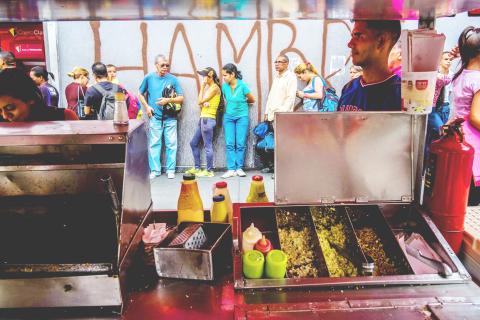Amid the financial and humanitarian crisis in Venezuela, the country is expected to see hyperinflation reach epic proportions: 1 million percent by the end of this year, the IMF said on Monday.
Moreover, Venezuela’s economic collapse will increasingly spill over into neighboring countries, the IMF said in its updated regional outlook for Latin America.
“We are projecting a surge in inflation to 1,000,000 percent by end-2018 to signal that the situation in Venezuela is similar to that in Germany in 1923 or Zimbabwe in the late 2000s,” said Alejandro Werner, head of the IMF’s Western Hemisphere Department.

Photo: AFP
However, that estimate “has a much higher degree of uncertainty” than most inflation forecasts, he told reporters.
Still, whether the rate ends up at 1.2 million or 800,000 percent “the destruction of prices as the mechanism for allocating resources has already happened,” he said.
The Venezuelan economy is expected to contract by 18 percent this year, the third consecutive year of double-digit declines and three points worse than projected in May, amid falling oil production, he said in a statement.
That would mean the country that is seeing waves of citizens fleeing the crisis, while those left suffer increasingly from illness, lack of medicines and weight loss from lack of food, would have contracted by 50 percent in the past few years, one of the few times that has happened in the past half century or more.
Werner cited economic “distortions” in Venezuela’s policies, including printing money to finance the government.
“We expect the government to continue to run wide fiscal deficits financed entirely by an expansion in base money, which will continue to fuel an acceleration of inflation as money demand continues to collapse,” he said in the statement.
OPEC data show Venezuelan oil production crashed to a new 30-year low of 1.5 million barrels a day last month, even though the country has the world’s largest reserves of crude.
The South American nation earns 96 percent of its revenue through oil sales, but under the government of Venezuelan President Nicolas Maduro a lack of foreign exchange has sparked economic paralysis that has left it suffering serious shortages.
Venezuela’s collapse is dragging down growth in Latin America and the Caribbean to 1.6 percent this year, four-tenths lower than the May forecast.
However, excluding Venezuela, the region “continues to recover” amid a pickup in consumption, with growth of 2.3 percent this year and 2.8 percent next year.
Argentina, which just signed a loan agreement with the IMF, is expected to see its economic growth slow to 0.4 percent this year, rather than the 2 percent forecast in May.
However, the country should see “a gradual recovery in 2019 and 2020 that will be supported by restored confidence under the Fund-supported stabilization program,” Werner said.

DIVIDED VIEWS: Although the Fed agreed on holding rates steady, some officials see no rate cuts for this year, while 10 policymakers foresee two or more cuts There are a lot of unknowns about the outlook for the economy and interest rates, but US Federal Reserve Chair Jerome Powell signaled at least one thing seems certain: Higher prices are coming. Fed policymakers voted unanimously to hold interest rates steady at a range of 4.25 percent to 4.50 percent for a fourth straight meeting on Wednesday, as they await clarity on whether tariffs would leave a one-time or more lasting mark on inflation. Powell said it is still unclear how much of the bill would fall on the shoulders of consumers, but he expects to learn more about tariffs

NOT JUSTIFIED: The bank’s governor said there would only be a rate cut if inflation falls below 1.5% and economic conditions deteriorate, which have not been detected The central bank yesterday kept its key interest rates unchanged for a fifth consecutive quarter, aligning with market expectations, while slightly lowering its inflation outlook amid signs of cooling price pressures. The move came after the US Federal Reserve held rates steady overnight, despite pressure from US President Donald Trump to cut borrowing costs. Central bank board members unanimously voted to maintain the discount rate at 2 percent, the secured loan rate at 2.375 percent and the overnight lending rate at 4.25 percent. “We consider the policy decision appropriate, although it suggests tightening leaning after factoring in slackening inflation and stable GDP growth,”

Greek tourism student Katerina quit within a month of starting work at a five-star hotel in Halkidiki, one of the country’s top destinations, because she said conditions were so dire. Beyond the bad pay, the 22-year-old said that her working and living conditions were “miserable and unacceptable.” Millions holiday in Greece every year, but its vital tourism industry is finding it harder and harder to recruit Greeks to look after them. “I was asked to work in any department of the hotel where there was a need, from service to cleaning,” said Katerina, a tourism and marketing student, who would

i Gasoline and diesel prices at fuel stations are this week to rise NT$0.1 per liter, as tensions in the Middle East pushed crude oil prices higher last week, CPC Corp, Taiwan (台灣中油) and Formosa Petrochemical Corp (台塑石化) said yesterday. International crude oil prices last week rose for the third consecutive week due to an escalating conflict between Israel and Iran, as the market is concerned that the situation in the Middle East might affect crude oil supply, CPC and Formosa said in separate statements. Front-month Brent crude oil futures — the international oil benchmark — rose 3.75 percent to settle at US$77.01